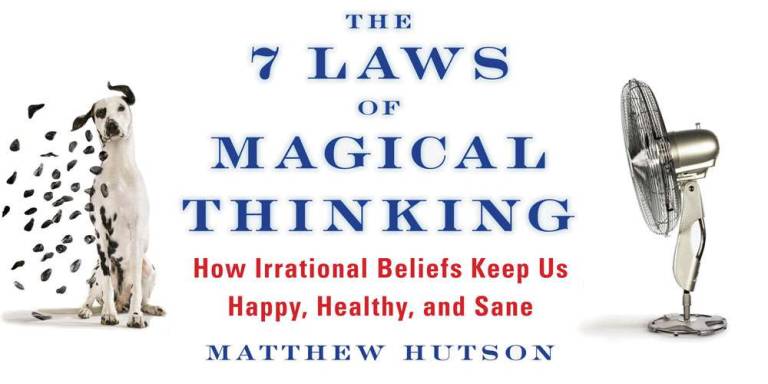Matthew Hutson and the 7 Laws of Magical Thinking

"There Is Superstition" wrote Stevie Wonder famously in 1972. Ever wondered why we hold on so dearly to our superstitions? Matt Hutson may have the answers. By Jeff Vasishta Capitalizing on the recent success of books on social psychology by Malcolm Gladwell, Matthew Hutson's new book is called "The 7 Laws Of Magical Thinking - How Irrational Beliefs Keep Us Healthy, Happy and Sane" (Hudson Street Press). Hutson's specialty is making complicated theories understandable to the layman. Why do we "knock on wood", "thank our lucky stars" and why does God get blamed for so much? In a Q&A session at the New School, three blocks from his apartment, Hutson, 33, a former editor of Psychology Today, talked about his debut. Q: Do you think there may be a blow-back from religious groups about this book as you seem to state a case for atheism in it? A: I see the book as very logical. I'm trying to convince atheists that belief isn't so bad. I don't think I'll ever convince someone that believes in God that he isn't real. There isn't any hard evidence that God doesn't exist. If anything I might convert some atheists to not be so dismissive. Q: You're single but if you had kids how would you raise them? A: I was raised Protestant. I will raise my kids as atheists and if they want to believe in God they can. My parents are still both Protestant Christians but they don't take any offense in my not being a Christian. Q: How did this book come about? A: It's been sitting in my head for 20 years. I wrote an article that was 3-4000 words in Psychology Today and was contacted by a couple of agents who said that this might be a good book. Then I wrote a proposal which was between 5-10,000 words and took me a couple of months. I submitted some sample chapters to publishers through my agent and got a few bites within a couple of weeks. Q: Although you have a BS from Brown University in Cognitive Neuro Science and an MS from MIT, you don't have a PHD in Psychology. What would you say to doctors of psychology that may question your credentials to write such a book? A: The job of any journalist is to do enough research so you know more than the people you are explaining things to. I understand this market differently than the psychologists that are quoted in the book as they can't be an expert on everything, so I think I have a better overall understanding than someone who maybe an expert in one particular field. Q: In the book you say you had a lonely childhood. Why?Are you less lonely now? A: My older sister went off to school when I was 10. My loneliness when I was growing up wasn't through lack of friends or self-imposed it was through existentialism and my own thoughts about things. I think I've always been something of a deep thinker, so that separates you a bit from other kids. I'm still the same way, obviously but I think less of a loner now. Q.How long have you lived in the village? A. I've lived in the East Village for six years. Three years at Ave. A and 6th and three years at 13th and 3rd. Q.What made you choose the village to live? A.When I moved to New York I did some research on neighborhoods. I wanted to live in Manhattan below 14th Street because of the energy. The East Village was relatively affordable, and there was a lot of life here. It's safe, but there's still a bit of an edge. There are lots of great bars and restaurants and little shops and I love walking around. Q. What are your favorite restaurants? A. I don't eat out a lot, but places I like include Sidewalk Bar & Grill, Momofuku Milk Bar, Porchetta, the green eggs at Paprika, and the corn ice cream at Sundaes and Cones. Q. How Does the Village inspire you if at all? A. Working at home, I spend a lot of time in my room, but even when I'm cooped up inside I get a taste of the town through my window. Sometimes I take a minute and just lie on my bed and people-watch. It gets me out of a rut. Matthew Hudson will will be appearing at McNally Jackson, 52 Prince St (between Lafayette and Mulberry) on August 1st as part of a discussion with other authors entitled, "The Shrinks Are Away".